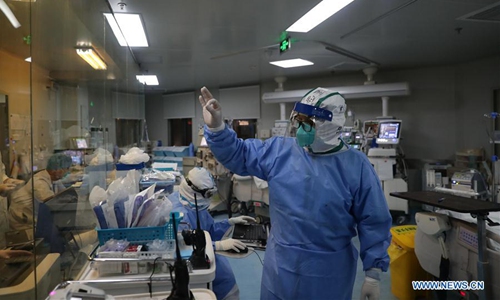HOME >> OPINION
Sharing and giving to fight COVID-19 in the globalization era
By Javid Ahmad Qaem Source:Global Times Published: 2020/3/22 18:08:40

Doctor Hu Ming gestures "OK" after completing a surgery on a patient of COVID-19 in critical condition at a hospital in Wuhan, central China's Hubei Province, March 21, 2020. Doctors from Beijing, Jiangsu and other four different provinces have successfully completed the three-hour surgery on a male patient of COVID-19 in critical condition with joint efforts. (Photo by Ke Hao/Xinhua)
Beijing is an interesting place for any ambassador to test his or her diplomatic skills. However, for me, during the first months at my post, it was fascinating to witness how COVID-19 emerged.When initial cases emerged, nobody knew what was happening or what they were facing. The only information available appeared to be that people who went to a seafood market in Wuhan had contracted pneumonia-like symptoms but were more serious.
The local government and hospitals responded, but it was not enough. The number of COVID-19 patients increased exponentially every day.
In January, the virus seemed uncontrollable. It was brought to the attention of China's senior leadership. The country's top leadership became heavily involved. The outbreak was underway during the biggest annual Chinese holiday - Lunar New Year.
Everyone was planning to spend their holiday in their hometowns, and many had already left. However, nothing would prevent the government from curbing the virus. Having experienced similar outbreaks such as SARS, China knew what to do. They knew they were racing against time, so they had to act fast.
Wuhan and surrounding cities were quarantined. People were told to stay home. Public transportation was halted. The holidays and celebrations were canceled, and travel across the country was limited. Medical personnel and supplies were sent to Hubei Province.
Public places such as stadiums were converted to temporary hospitals, and even new hospitals were built within days, which can be called the "Chinese Speed." China also began sharing information for three groups, the domestic population, the country's diplomatic core, and the world.
These were tough days. There were days that saw over 3,000 new patients registered at hospitals while another 200 would die. China knew it was on the right path and again proved they were right, thus winning the race against time.
As an ambassador in China, I was astonished to see the material and mental support provided by many countries. Suddenly, there was a dire need for basic medical equipment such as face masks. Several countries sent medical supplies to China. Afghanistan is a poor country and mostly dependent on medical supplies from other countries. So, I was amazed to see a group of Afghan students in China donate face masks which they had bought themselves.
Many countries, including Afghanistan, sent sympathetic messages to the leadership and everyone in China and kept the embassies open to serve their Chinese friends. It was a warm sight for global solidarity.
It was also during this period that the world had enough time to make adequate preparations. The World Health Organization said it was a window of opportunity, yet nobody took precautionary steps. It was considered solely a Chinese problem. This period was spent on debating whether China was doing right or wrong and whether anyone else had to do anything.
After two months, COVID-19 cases had emerged in Iran and Italy, two countries in two different continents. Within two weeks, it had become a national emergency on both countries. The virus quickly spread to other countries and became a global pandemic and one that everyone on this planet must fight.
The recent incidents prove that we live in a global village. It would be impossible for part of the village to be affected by a catastrophe and that it would not spread to other parts. Therefore, solidarity is required from all of us for the sake of humanity. We must help each other during difficult periods.
We have already lost time and cannot lose more. Every country and individual must work closely with each other to prevent a humanitarian crisis. Sharing information is essential. No one can benefit when another country withholds information.
China's outbreak measures and methods were effective. They were based on simple rules of social distancing and personal hygiene. We are supposed to learn from them and implement them in our countries however possible. It is also up to China to share their experiences with the world to help other nations curb the outbreak.
Another Chinese approach that prevented the world from contracting the virus was how they treated foreigners living in China. Everyone was treated equally. Other countries must do the same. Expelling foreigners or treating them poorly is not a solution. COVID-19 will likely spread to other parts of the globe in the short term, and in the long term it could create grievances and grudges.
Weaker countries need help with their healthcare system. Should they experience an outbreak, it would be a disaster. Re-imported cases of COVID-19 to China have been reported. China is still going through tough times, but it is also better suited to help those small countries by sharing experiences and helping build a better response system.
The author is Ambassador of the Islamic Republic of Afghanistan to China. opinion@globaltimes.com.cn
RELATED ARTICLES:
Posted in: VIEWPOINT